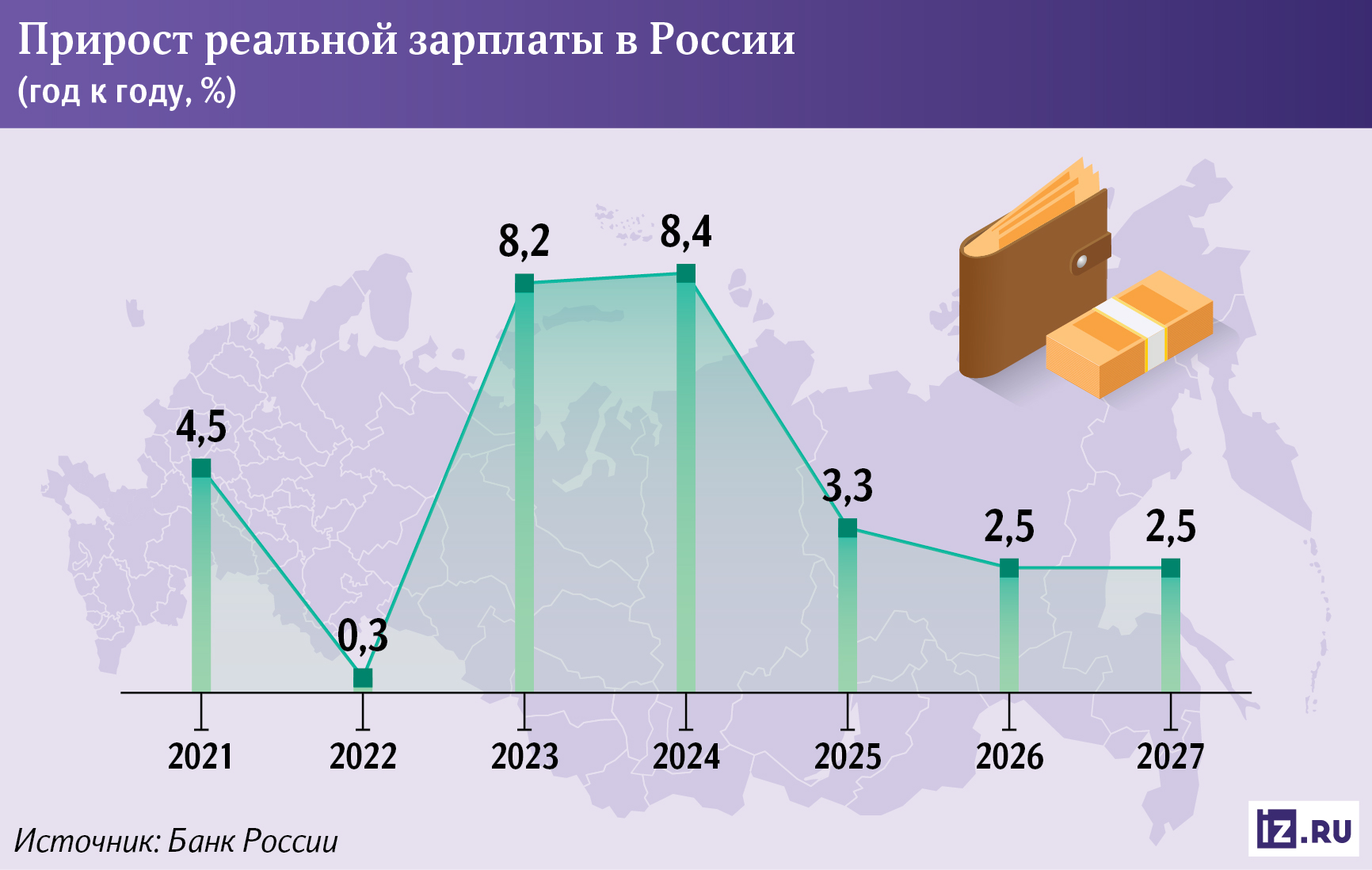Reduce income: real wages will grow by only 3.3% in 2025

Real wages will grow by only 3.3% this year, analysts polled by the Central Bank predicted. We are talking about an increase in people's disposable income, i.e. with inflation correction - for comparison, in 2024 they increased by 8.7%. After a series of record salary increases in the last two years, companies have run out of resources to "re-buy" employees in the context of staff shortages, high key rates and the need to optimize costs. However, there is a positive side to what is happening: the cooling of the "wage race" may eventually slow down inflation. Izvestia reports on what the average salary in Russia may become and who is the most profitable to work in conditions of staff shortage.
What salaries will be in 2025
In 2025, nominal wages will grow by 12.5%, while the real (that is, taking into account inflation) - only by 3.3%. This follows from the results of the February macroeconomic survey of the Central Bank ("Izvestia" studied it). The regulator used the answers of 27 economists for the calculation. Their estimate is twice lower than the most recent, September forecast of the Ministry of Economic Development, which assumes an increase in real wages by 7% in 2025.
Over the past two years, Russia has been experiencing an acute shortage of personnel, which has caused employers to raise salaries to record levels in the fight for employees. Thus, according to the Central Bank, in 2023 the growth of real wages amounted to 8.2% year-on-year. And for the incomplete 2024, the figure increased by 8.7%, said Prime Minister Mikhail Mishustin at a meeting with Russian President Vladimir Putin on February 7.
According to Rosstat, last November the average accrued salary in Russia amounted to 86.4 thousand rubles (before taxes). The indicator for December is not yet available, but it tends to be less informative, as it takes into account bonuses and thirteenth salaries. And according to hh.ru calculations, the median offered earnings (when half of the people earn less than this amount, and the rest - more) last year was at the level of 67 thousand rubles.
This year, due to the increase in salaries in industries with a shortage of staff, the average salary in Russia may rise to 90 thousand rubles, expects leading analyst of Freedom Finance Global Natalia Milchakova.
Is the wage race in Russia over?
Olga Belenkaya, head of the macroeconomic analysis department at Finam Financial Group, believes that the problem of staff shortages is likely to persist in 2025. But the demand for employees may decrease, as companies expect some slowdown in the economy: according to the forecast of the Ministry of Economic Development, GDP in 2025 will add 2.5% against 4.1% in 2024.
Also, organizations are under pressure from high interest rates (the key rate for February is 21%) and the change of income tax from 20% to 25%, added Olga Belenkaya. All this may force companies to optimize costs and limit their ability to increase salaries, the expert believes.
Financial opportunities of business amid the high cost of borrowed funds are exhausted, so in 2025 the growth of salaries will continue, but its pace will slow down significantly, agreed Natalia Danina, chief expert of hh.ru on the labor market.
- A major role in the growth of average wages in 2025 will play not even so much the struggle for employees on the part of private companies, as the indexation of salaries to public sector employees and the increase in the minimum wage from January 1 to 22.4 thousand (instead of 19.2 thousand) - and on it in many organizations and depends on the salary, - said Natalia Milchakova from Freedom Finance Global.

According to the regulator's survey, in the next two years (2026 and 2027) the growth of real wages may slow down to 2.5%. "Izvestia" sent a request to the Ministry of Labor to comment on the forecast of analysts polled by the Bank of Russia.
Who's salaries will grow the most
The situation with the shortage of personnel in specific professions will largely determine those who will continue to see their salaries rise. Most likely, workers will get a salary increase at a rate higher than the market, but mass personnel in trade, logistics and services - at the rate of inflation or slightly more, says Natalia Danina from hh.ru.
In February 2025, the fastest wages are growing for engineers and HR, as well as for personnel in the transportation and banking industries, shared in SuperJob.
- Personnel will flow between industries. In capital-intensive sectors, such as construction and development, the number of new projects is declining - because of this, both hiring and salary growth may slow down. At the same time, the demand for employees in consumer segments (e.g., food production) will remain stable," said Dmitry Puchkov, managing director of Avito Rabota.
Most likely, salaries will also grow fastest for workers in the manufacturing industry - primarily in the defense sector, expects Viktor Lyashok, a leading researcher at the INSAP center of the IPEI Presidential Academy. To maintain market levels, other non-state enterprises will also be forced to raise salaries to retain workers, he added.
What a slowdown in the wage race means for the economy
Olga Belenkaya from Finam recalled that in the past years, the growth of real wages was significantly outpaced by the growth of labor productivity amid a severe shortage of personnel. Thus, in 2023, the average salary increased by 8.2%, while labor productivity increased by only 1.9%. In the third quarter of 2024, the indicators amounted to 8.1% and 3.4%, respectively. Such a gap was last observed in 2005-2008. This may become one of the factors of high inflationary pressure, the expert noted. That is, people create a little more than before, but get much more for it - as a result, money becomes cheaper.
So the growth of wages in 2025 - if it slows down - will be more in line with the level of labor productivity, she continued. That will lead to more subdued consumer demand and lower inflation.
The cooling of wages may also lead to an increase in labor migration toward big cities, where there are more opportunities, expects Natalia Buletova, a professor at the Department of Public Administration of the Economy of the Institute of State Management of the Russian Academy of National Economy and Public Administration.
Another possible consequence is that employees will change employers more often, believes Natalia Milchakova from Freedom Finance Global.
At the same time, the labor market in 2025 will remain aspirational. Companies that are unable to raise salaries will retain staff with one-time bonuses, a social package (e.g., insurance) or flexible schedules, the expert believes.
Organizations are indeed improving working conditions, confirmed Dmitry Puchkov from Avito Rabota. According to the platform, businesses are increasingly offering VHI (2.7 times year-on-year growth), recreation areas (2.5 times), free meals (2.2 times) and payment for accommodation (2 times) if people need to move.
However, SuperJob believes that competitive salaries are still the most effective tool for attracting and retaining staff.
Переведено сервисом «Яндекс Переводчик»





